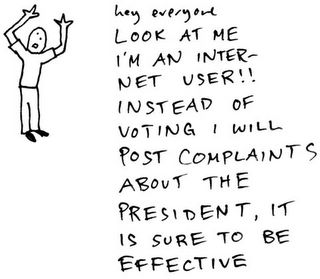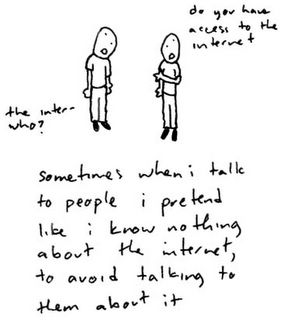I have read both the advice of
Nielsen and
Flanders on web design. Both kindly tell you what they think about web design and what they consider good and bad, but they by no means are omniscient about the matter. I feel that site designers should simply think about what audience they are targeting and design the page for them.
I think generally, bands are not going to convert new listeners by having a site that is easy to navigate. One of the best examples of "mystery meat" navigation is found at the
Explosions in the Sky site. I think they might be better served with this site set up, because its cool and people, like me right now, will pass it along for that sole fact. As far as I am concerned, that’s the best they could ask for.
In class last night we kindly ripped an old MoMa site apart. Yes, I full heartedly agree that the site was hard to navigate, but just like with modern art, let’s step back a bit and look at it for what it is worth.
The
MoMa site was designed for those interested in the
museum… those interested in that
museum would be those interested in
modern art... those interested in
modern art don’t necessarily like things
spelled out for them… those who don’t like things
spelled out for them tend to like
visually appealing and creative web work… those who like visually
appealing and creative web work would clap for the
MoMa’s site design.
From where I was sitting in class, I could not tell if they had a site map or not. If they did not, they should, for more logically inclined web viewers, to compliment their site that appeals to right brained people.
Now, by no means, am I arguing that cool looking hard-to-navigate sites are the way to go. As
Emi said, a political site should NEVER be difficult to navigate. I just want to point out that web design is by no means universal. What might work for one product or idea push will not necessarily work for another. Please don’t take any one single person’s thoughts on what a good website consists of, but instead step back and think about who your audience is and tailor it to appeal to them. Nielsen and Flanders did not write Website Bibles.





